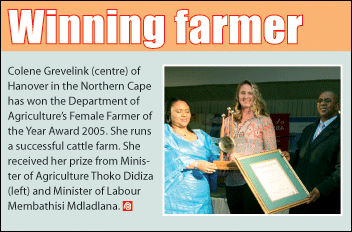Oct 2005
Oct 2005 sadmin'Disabled', but capable
'Disabled', but capable sadmin
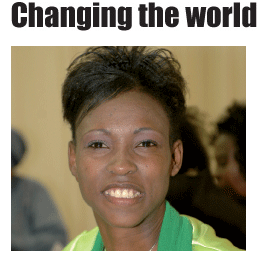

2010 Soccer World Cup - Wosa 2010
2010 Soccer World Cup - Wosa 2010 sadmin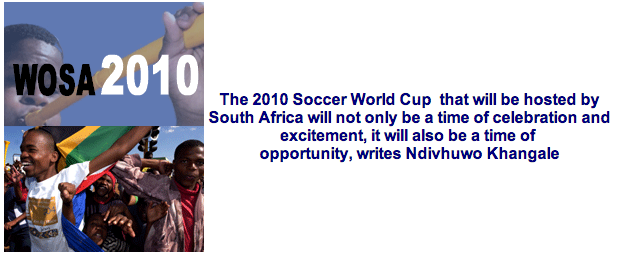
Are you sure you are SINGLE?
Are you sure you are SINGLE? sadmin
Government's support for small business
Government's support for small business sadmin
Health Advice - speak to your doctor
Health Advice - speak to your doctor sadmin
- The Road to Health Card
- Where do you get the road to health card?
- What must I do with the card?
- Why do doctors and nurses need the card?
- Don’t forget!
- How long must you keep the card?
- What if I lose the card
How to be safe and careful with your money
How to be safe and careful with your money sadmin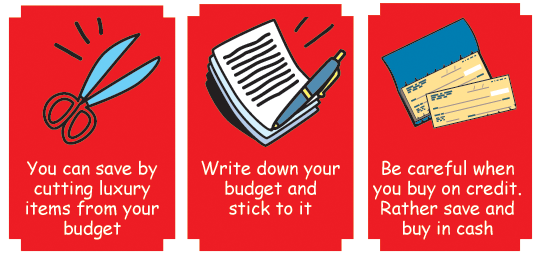
- No matter how little, bank all your money so that you can get interest. Your money grows (becomes more) with interest.
- Do research on which bank will give you the best interest rate. Remember to find out about bank charges as well.
- Do a budget every month. Your budget should show all your income and all your expected expenses.
- When you go shopping look around for the best price.
- Always shop with a shopping list and stick to your list.
- Always work towards a financial goal. This means that you need to know what you want to do with all the money you have saved.
- Make notes of all the money you spend so that you can see where your money went.
- If you were forced into debt, pay it off as soon as possible.
- Start a savings club with a few friends (like a stokvel).
- Pay cash for everything you want — don’t buy it if you can’t afford it.
- Spend less than you earn.
- Don’t borrow money as it teaches you that it is okay to be in debt. It’s not!
- Don’t go to sales and buy things you don’t need.
- Just because you have R2 does not mean you must spend it. Save it and get something you really want or need.
- Stop and think before you buy anything.
- A sale is not a sale if you still cannot afford it.
- Window-shopping is fun.
- Money does not spoil:
- You can always find a use for it in the future;
- Don’t spend it just because you can;
- There might be rainy days when you need money for the unexpected;
- Approach money decisions in a business-like manner. Money is an emotional issue. Especially when it comes to borrowing and lending to family
- Buy necessities first and luxuries last.
- Negotiate prices and ask for discounts (especially when buying cash).
Imbizo Feedback - Getting local Government right
Imbizo Feedback - Getting local Government right sadmin
More help
Cabinet approved a programme for ministers and deputy ministers to work with provincial and local leaders to help struggling municipalities.
“The aim is to improve service delivery at these municipalities,” government spokesperson Joel Netshitenzhe said.
Government has also decided that no municipalities should overlap into more than one province.
“Each municipality in the country should be located in one province to ensure better service delivery,” Netshitenzhe pointed out. BuaNews
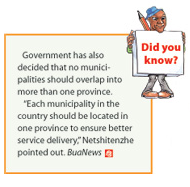

Letters
Letters sadmin
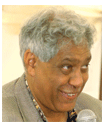
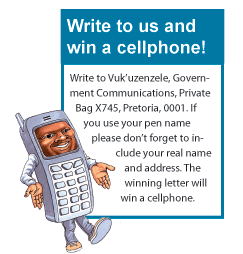
OPPORTUNITY KNOCKS - Dept of Public Works
OPPORTUNITY KNOCKS - Dept of Public Works sadmin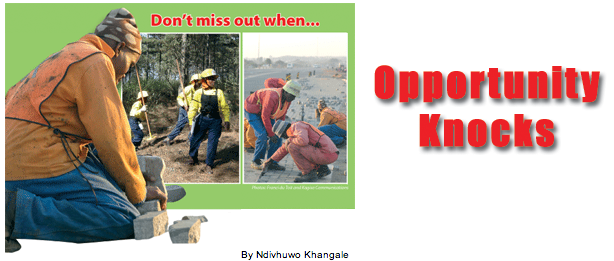
President Mbeki welcomes Vuk'
President Mbeki welcomes Vuk' sadmin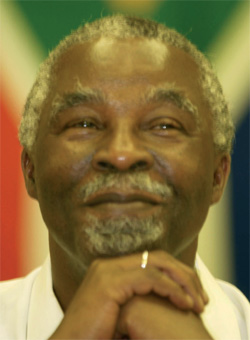 The struggle to free our people and rebuild our country has taught us important lessons. One lesson is that the people are their own liberators. To bring real and lasting change for the better, all of us need to work together. Each of us needs to do what we can to help drive back the frontiers of poverty. Every person and every community has a part to play in turning our society from one that was divided and unequal into one that is just and prosperous. In the first ten years of our freedom we made much progress as a nation towards a better life for all. Millions of our people now enjoy basic rights they were denied before. But many still lack clean water; many do not yet have the electricity that has brought light and warmth to millions of others; there are many villages that do not have proper roads.
The struggle to free our people and rebuild our country has taught us important lessons. One lesson is that the people are their own liberators. To bring real and lasting change for the better, all of us need to work together. Each of us needs to do what we can to help drive back the frontiers of poverty. Every person and every community has a part to play in turning our society from one that was divided and unequal into one that is just and prosperous. In the first ten years of our freedom we made much progress as a nation towards a better life for all. Millions of our people now enjoy basic rights they were denied before. But many still lack clean water; many do not yet have the electricity that has brought light and warmth to millions of others; there are many villages that do not have proper roads.
Though many jobs have been created, many of our people do not have proper jobs — or any work opportunities at all — and must struggle to make a living as best they can. This is mainly because they were denied the education and the skills that would have given them the possibility to find decent work or start their own businesses. Since we achieved freedom, government has created many programmes to improve the lives of especially the poor and to help make our economy grow. They bring opportunities for work and skills development; new access to credit; support for small farmers; improvements in housing and basic services; better roads and transport. But government on its own cannot make these programmes work. Communities and individuals need to seize the opportunities of democracy, so that together we make the best use of the resources that we have as a nation, steadily to continue improving the lives of all who live in South Africa. Our experience has also taught us that without information, people cannot make use of these opportunities. So one of the critical elements of the programme of change is to expand the platforms of government communication, so we can provide the majority of citizens with information they need to improve their lives. Vuk’uzenzele is our new addition to the arsenal of information tools to bring you information you can use. Its name and its content speak of a partnership that we must continually forge – between government and all citizens – in building a South Africa that truly belongs to all! Together, let’s make it happen!
Register to have your say
Register to have your say sadminLocal Elections
By only making an X, people with valid SA identity documents (ID) and who have registered as voters, will once again make a difference by voting in the coming municipality elections. The official date for the election has not been announced, but Independent Electoral Commission chief electoral officer Advocate Pansy Tlakula said it will be any time between 7 December and 6 March 2006.
Announcement
Provincial and Local Government Minister Sydney Mufamadi will make the announcement. Tlakula said voting in the municipal elections was vital, because voters were able to elect people who they think will work for them in the municipality. “Unlike the national elections, with municipal elections, you are only allowed to vote in the area where you have registered. If you work in Johannesburg and live in Limpopo and know that you will be in Limpopo during the elections, you have to register there,” Tlakula said.
Challenge of turnout
“Our challenge is to keep a high voters turn-out. The turn-out for municipal elections is generally low world-wide,” she said. Tlakula added that they have registered more people in rural areas, because their campaign was more focused there. “We use catchy and streetwise music for our television and radio advertisements to get more young people to vote. ,” Tlakula said. “Earlier this year, we conducted a door-to-door campaign registering people whose voting districts have changed due to the new municipal borders,” she said.
Register
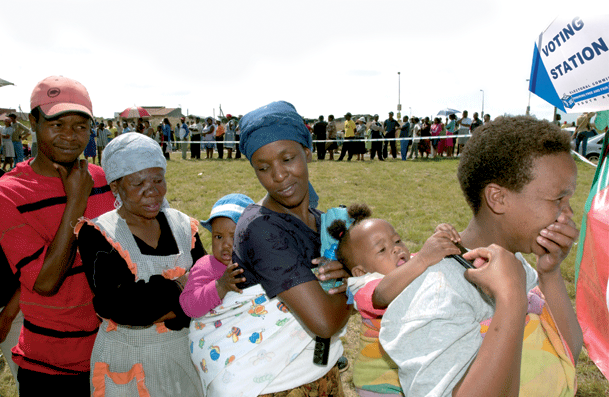
To check if you are registered, SMS your ID number from any cellphone to 32810, or call toll free number 0800 11 8000 between 8am and 5pm during the week.
You can register at your local Municipal Electoral Office. To find out where it is, call the IEC on 012 428 5700.
Social grants and loans: Help is close at hand
Social grants and loans: Help is close at hand sadmin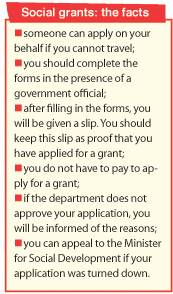
When life gets really tough and you need to seek help from the state, what do you do? If you go to government for help, you can do one of two things: you can apply for a grant or you can apply for a loan. If you apply for a grant, you do not have to pay back the money you received. If you apply for a loan, you will have to pay back the money you received.
Social grants
You can apply for a grant from any office of the Department of Social Development. A number of different grants are available, such as old age grants, disability grants, care dependency grants, foster child grants and child support grant. The chief executive officer of the South African Social Security Agency, Fezile Makiwane, said 9 million people get social grants amounting R3,3 billion every month.
Loans
Organisations such as the National Student Financial Aid Scheme (Nasfas) give loans to students at universities. Mvuyo Macanda of Nasfas said before a loan could be approved, students have to prove that their families are poor and that they passed the previous year. He said last year Nasfas had spent R986 million on loans to 98 000 students. The Umsobomvu Youth Fund give loans to young people to start their own businesses.
Umsobomvu does not require security for a loan. Loans can be paid back over a period of between three and five years.
